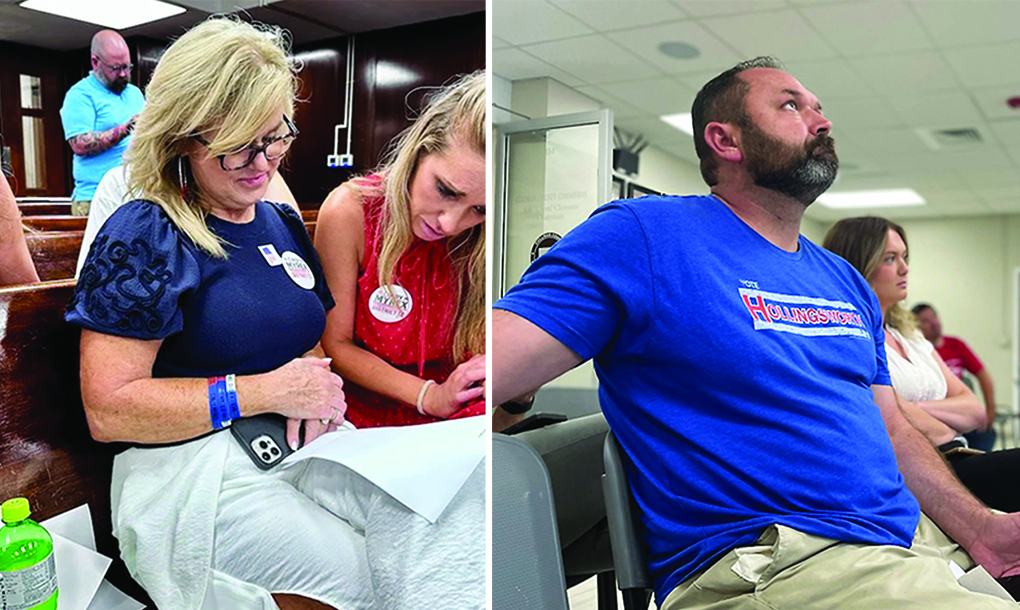Veterans groups wary of Trump’s call for VA reform
Published 5:45 pm Friday, August 12, 2016
WASHINGTON – Beset with controversy over long wait times, the Veterans Health Administration is a popular target for Republican presidential candidate Donald Trump, who says he wants to make it easier for veterans to see private doctors.
But his calls for an overhaul of the veterans health care system, and those of Congressional Republicans, face a seemingly unexpected source of opposition – veterans groups.
Trending
Organizations such as the Veterans of Foreign Wars worry the idea will lead to more privatization of the health care system and that private doctors will be less likely to connect veterans with government specialists for problems such as mental illness.
It ultimately could spell the demise of the Veterans Health Administration, which despite its problems is reputed for its care for spinal injuries and other specialized conditions, according to groups including Disabled American Veterans.
Carlos Fuentes, the VFW’s senior legislative associate, said veterans also could be expected to pay more for coverage.
Trump, speaking to the VFW National Convention in Charlotte last month, attempted to allay some of the groups’ fears, saying the “veterans health system will remain a public system because it is a public trust.”
Fuentes, in an interview, held out hope that Trump’s position is “evolving.”
However, Trump also said, “Never again will we allow any veteran to suffer or die waiting for care. That means veterans will have the right to go to a (Veterans Affairs) facility, or the right to see a private doctor or clinic of their choice – whatever is fastest and best for the veteran.”
Trending
How he would make that happen is hard to tell, said Gary Augustine, a Vietnam War veteran and executive director of the 1.3 million-member Disabled American Veterans.
Trump’s campaign did not respond to a press inquiry on Friday, and he hasn’t laid out details.
Augustine and others remain concerned.
Veterans groups in the past have protested proposals similar to Trump’s, including a draft bill released in June by a high-ranking Republican, Rep. Cathy McMorris Rodgers, of Washington, which proposes splitting the Veterans Health Administration.
The VA’s health system would partly be recreated by a non-profit that provides medical care. A second agency would administer new health plans for veterans, covering visits to private doctors.
”With the never-ending wait times … the time has long passed for the VA to make the necessary changes to ensure that our veterans are treated effectively, seen efficiently, and cared for with respect,” McMorris said in a statement at the time. “Veterans should be freed from a system that offers them little or no choice.”
In response to long waits, the VA health system has allowed veterans who cannot get into a clinic, or live too far away, to see private doctors. Rodgers’ plan would not restrict which veterans may see private doctors.
A conservative veterans group proposed another version of her idea to a congressional commission studying the Veterans Health Administration.
Concerned Veterans for America’s plan, supported by a minority of members on the Congressional Commission on Care, would not have ended the health administration right away. But it would have distributed medical cards allowing veterans to see private doctors.
Arguing for a “bold transformational change,” the proposal called for VA clinics to be closed as demand to see agency doctors decreases.
Despite the VA health system’s problems, leaders of veterans groups said in interviews that they are satisfied with the quality of care – once veterans get appointments.
Rather than reducing the Veterans Health Administration, they favor improving the agency and filling a funding backlog that’s led to a shortage of doctors and nurses.
“If you’re seeing a physical therapist and you need a prosthesis, they can just send you down the hall at the VA instead of making you drive around the community,” Augustine said.
A VA doctor who sees a patient with mental illness can get them into psychological treatment. A private doctor may not, he said.
Augustine also worries that private doctors may not treat patients for injuries unrelated to their military service.
Sherman Gillums Jr., executive director of Paralyzed Veterans of America, said he fears a shift toward more private doctors will also mean the loss of legal protections.
Veterans now may file malpractice complaints with the VA, which investigates their claims. It’s unclear if veterans would have to file lawsuits if they have complaints about private doctors contracted by the VA health system.
Fuentes said Rodgers’ draft bill calls for veterans to pay co-payments and deductibles, while low-income veterans would get subsidies.
However, the Veterans Health Administration largely does not require co-payments, he said.
He also worries that Congress could increase funding for private care but reduce it for traditional VA health services.
Sen. Johnny Isakson, R-Ga., chairman of the Senate Veterans Affairs Committee, said in an interview that there’s merit to allowing veterans to see more private doctors, but he said those physicians should be part of a network working with the VA’s health system.
That was in line with the congressional commission’s proposal for the VA to contract with more private doctors, whom it would certify as part of a network of medical providers.
Veterans groups generally support that idea but say the VA should only contract with private doctors in areas where not enough government doctors are available, or if private providers bring an obvious benefit – “like if there’s a world-renowned cardiologist across the street,” Fuentes said.
Democratic presidential nominee Hillary Clinton has suggested similar ideas.
A campaign fact sheet says the Veterans Health Administration should “strategically purchase private sector care when it makes sense to do so, such as for some specialty inpatient or surgical procedures, expanded access to mental health and substance abuse treatment, or when the VA cannot provide timely access to necessary care.”
Kery Murakami is the Washington, D.C. reporter for CNHI’s newspapers and websites. Reach him at kmurakami@cnhi.com
###






